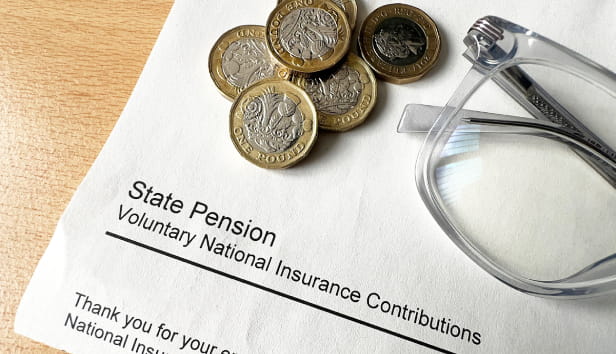

Get all our latest money stories and exclusive offers direct to your inbox. Sign up here.
This article is for general guidance only and is not financial or professional advice. Any links are for your own information, and do not constitute any form of recommendation by Saga. You should not solely rely on this information to make any decisions, and consider seeking independent professional advice. All figures and information in this article are correct at the time of publishing, but laws, entitlements, tax treatments and allowances may change in the future.
With the Budget speculation finally over, this is the ideal time to review your finances. With tax rises, continued freezes to tax thresholds, and cost of living that continues to rise, many people are noticing the impact.
So it’s an ideal time to make sure that your money is working as hard as it can be for you – now and in the years to come. Use our step-by-step money health check to stay financially confident and resilient.
What’s on this page?
Start with a review of your income and spending for the year ahead. You can use the previous year as a guide, but don’t forget to allow for rising costs and any other differences. Most tax and benefits changes in the Budget kick in from either April 2026 or April 2027 - see our Budget round-up to know what's happening when.
Record regular outgoings, plus annual ones, such as insurance renewals, holidays, birthdays and Christmas, boiler servicing, car tax, and so on. MoneyHelper has a useful budget planner that can help you map out your finances clearly. Some people find it useful to divide spending into needs (such as housing, utilities, groceries), wants (non-essential spending), and savings & debt repayments.
This is a good time to think about your financial goals: perhaps paying off your mortgage, adapting your home, helping family or preparing for retirement income to replace your salary. How do your income and the outgoings you have mapped out compare? Do they give you space to reach their goals, or are there adjustments you need to make?
Whether you’re comfortably off or feeling the squeeze, it’s always a good idea to make sure you’re not spending money that you don’t need to. Here are some questions to ask yourself – pick the ones that feel relevant to you.
Even modest adjustments can significantly improve your monthly cash flow, or take you further towards reaching your goals.
Factor in the latest Budget changes: tax thresholds, state benefits and savings allowances. The state pension was already expected to increase by 4.8% – this was confirmed in the Budget.
Hargreaves Lansdown’s head of personal finance, Sarah Coles, says: “Not every change feels huge, but unless you specifically factor it into your plans, it’s easy to get to the end of the month and wonder where your money went. If your income fluctuates, it’s worth basing your budget on months when money is tighter. It’s always going to be easier to spend the excess in good months than it is to make up a shortfall in the leaner ones.”
SunLife’s 2025 research shows almost half of over-50s have some form of debt, including credit cards, overdrafts or personal loans. If that includes you, this is a good time to take stock of every borrowing. It can be useful to list the creditor, balance, interest rate, monthly payment, end dates for any 0% deals, and mortgage details.
Prioritise essential debts first: mortgage/rent arrears, council tax, utilities. Then non-priority debts: credit cards, loans or ‘buy now pay later’. If you can’t pay everything off at once, focus on the highest interest debt first, while maintaining minimum payments on the rest. If things do feel overwhelming, contact StepChange or Citizens Advice for free, confidential support.
Check you’ve got enough cash to deal with the unexpected. If you’re working, aim for 3-6 months of expenses in an easy access account for emergencies. If you’re retired, it’s usually recommended to keep 1-3 years of essential expenses accessible, as it tends to be harder to rebuild savings quickly if something goes wrong.

With more households likely to be feeling the squeeze post-Budget, auditing your credit report is more important than ever. John Webb, consumer finance expert at Experian, says: “A healthy score can help you access better borrowing rates and avoid costly surprises. Regular checks will help you spot fraud early and help you to take steps to protect your financial flexibility for moments when you may need access to credit.”
Your insurance needs change with age, lifestyle and health, so review all your policies at least a month before renewal date. Sarah Coles says: “Check whether your cover still meets your needs and that none of your circumstances have changed that you need to let them know about.”
Ask yourself:
Also:
If you’re in drawdown (taking money out of your defined contribution pension), check the amount you’re taking is still sustainable for the long term. Helen Morrissey says: “During times of market volatility, you may need to reduce how much you are taking for a time to make sure it is sustainable long term. Keeping 1-3 years of essential expenses in easy-access savings can help supplement your income during these times.”
Rosie Hooper, chartered financial planner at Quilter Cheviot, says: “Review everything you have across savings and investments and ask whether it still reflects the life you are living today. Easy access savings should be earning a fair rate now, but that is likely to change as rates start to come down, so check you are not sitting in an old account paying next to nothing.
“If you have small investment pots scattered around, consider whether consolidation would make life simpler. It is also worth reviewing your risk level. The right amount of investment risk can change as your priorities shift, and what felt comfortable at 50 may not feel right at 65. A quick review can help ensure your money is still working towards the goals you care about most. ISAs remain important tax shelters, so any investments outside of them should be moved into ISAs within your annual allowance,” she says.
Tax often becomes more complicated later in life, especially when income comes from a mix of pensions, savings and part-time work. Rosie Hooper recommends:
Robust security for your personal financial data is essential. Always install software updates promptly and be cautious of unsolicited approaches. Rosie Hooper says: “Later-life finances are about control and confidence. Make sure you have strong passwords, and if you help family with finances, keep clear records of what is yours and what you are helping with.”
Rosie Hooper says: “Even if you feel fit and well, it is worth reviewing your will and considering a power of attorney, so the people you trust can act for you if needed. Your will takes care of what happens after you’re gone, but your power of attorney looks after you while you’re still here. Both are crucial,” says Rosie. A surprising quarter of over-55s don’t have a will, according to Canada Life.
If you’re concerned about inheritance tax, make sure you are up-to-date with the latest rules and consider how you can plan ahead to reduce the tax burden on your estate.


We partner with Co-op Legal Services to offer advice and services for you and your family.

Don't miss out on money you're owed. We show you how to trace forgotten pension pots.

.jpg?la=en&h=354&w=616&hash=F9CC575F418A6A99FA1D63301949576C)

